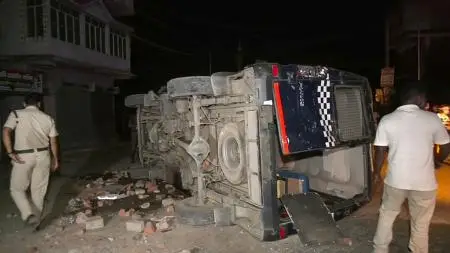Waqf law: Violence in Bhangar as police stop ISF march to Kolkata

Clashes in Bhangar as Police Block ISF March Over Waqf Law
Kolkata, April 15 — Tension gripped West Bengal’s Bhangar on Monday when Indian Secular Front (ISF) supporters clashed with police. The party had organized a march to Kolkata, protesting against alleged misuse of Waqf properties. But police stopped them near Bhangar, triggering violent scenes.
Hundreds of ISF workers, led by MLA Naushad Siddique, tried to move past police barricades. As they pushed forward, violence broke out.
Police Use Tear Gas as Protest Turns Violent
The protest turned chaotic when some demonstrators allegedly threw stones at police. Officers responded with tear gas and baton charges to disperse the crowd. Several people, including police and protesters, suffered injuries during the clashes.
Police said the ISF did not seek permission for the rally. They claimed the group disrupted law and order. But ISF leaders accused the police of acting on political orders and trying to crush dissent.
Police Detain MLA Naushad Siddique
Police detained ISF MLA Naushad Siddique during the unrest. After his release, he slammed the government and police action.
“We were peacefully protesting. The police attacked us instead of listening. This exposes the TMC’s fear of the truth,” Siddique told reporters.
He also said the ISF would continue its campaign through democratic and legal means. He demanded an inquiry into the state’s handling of Waqf land.
Why the ISF Is Protesting the Waqf Law
The protest centers around alleged irregularities in managing Waqf properties in West Bengal. These lands, meant for public welfare under Islamic law, are supposed to benefit the Muslim community. ISF leaders claim the government has misused or sold some of these lands.
They demand a full audit of the West Bengal Waqf Board. According to the ISF, many poor families have lost access to land meant for schools, hospitals, and mosques. The state denies any wrongdoing.
Opposition Targets TMC Over Police Action
The BJP criticized the Mamata Banerjee government over the police action. Party leaders accused the state of failing to handle protests and silencing opposition voices.
The Left and Congress also voiced support for the ISF’s right to protest. They condemned the police crackdown and called for accountability.
TMC leaders defended the action. They said the ISF tried to incite unrest and did not follow rules.
“Protests must follow the law. No one has the right to create chaos,” said a senior TMC spokesperson.
Bhangar Under Tight Security After Violence
After the clashes, police deployed additional forces in Bhangar. Rapid Action Force (RAF) units patrolled the area. Authorities monitored social media but did not block internet services.
Shops in the area shut down early, and public transport was briefly disrupted. Several schools remained closed on Tuesday as a precaution.
Rights Groups Demand Inquiry
Civil rights groups condemned the violence and urged restraint. The West Bengal Human Rights Forum asked the government to protect the right to protest.
“Police must not use force on peaceful protesters. Everyone must act lawfully,” said the group in a statement.
Activists demanded an independent inquiry into the police response and called for dialogue between all parties.
What Lies Ahead?
The situation in Bhangar reflects rising political tension in Bengal, especially with elections approaching. ISF leaders say they will continue raising the Waqf issue and plan more protests across the state.
The government stands firm, warning that it won’t tolerate disorder. Both sides remain locked in a political standoff. With minority rights and land issues at the core, the issue could influence voter sentiment in key constituencies.
Conclusion
The Bhangar violence shows how sensitive the Waqf issue has become in West Bengal. As opposition parties challenge the government, the need for transparency and dialogue has grown. People across the state now watch closely, waiting to see if peace returns—or if more conflict is on the way.






